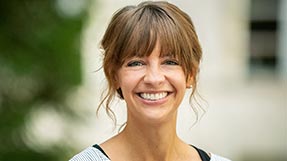
April
My Background
I am a Wisconsin native and graduated with a Bachelor’s degree in chemistry from Wheaton College. Upon graduating, I was not sure what to do with my chemistry degree because I was not interested in a PhD program or a career in research. I loved science and math and I like interacting with people, so I wanted to pursue something that affected others but also included interpersonal interactions rather than spending all day in a lab. My desire to make a difference led me to become a teacher since it allowed me to foster relationships with students while still having that impactful element. I recognized a teaching job did not fit me after six years of teaching high school chemistry. After witnessing a friend of mine make a similar job shift, I was inspired to pursue my ambitions of becoming a software engineer. The more I thought about it, the more I understood that chemistry is my favorite subject because it allows me to apply math to issues in the real world, much like software developers do every day.
My time spent teaching was both gratifying and exhausting. I was amazed by the tech industry’s adaptability since it looked to provide a wide range of chances. You could start off working for one company and go on to another because it seemed like the tech sector really valued agility. It was frightening to consider changing jobs and I questioned how I would go about doing this since I had never written a line of code in my life. After extensive research, I discovered the Align program. Instead of merely attending a boot camp like program, I loved the concept of obtaining a really strong foundation in computer science principles. I was drawn to Align’s co-op prospects as well because I believed that having industry experience would help me find employment once I graduated. I entered the Align program with the goal of obtaining my dream job at Spotify.
Bridge
My early program experiences were outstanding. I recall being there at the Align orientation and listening to the dean of Khoury College at the time discuss her goals for the program. Former Dean Brodley wanted us to understand that having an undergraduate degree in a different field was not a mistake and would set us apart in the IT sector. After she said that, I can still remember feeling comforted and thinking that my background would help my computer science career. I have always gotten a thrill out of academic challenges. When you finally solve a coding issue and the program runs, it is an amazing feeling. I also enjoyed meeting my new classmates and friends. Together, we were taking a risk by deviating from our previous paths, yet there was also excitement in doing so. The opportunity to pursue a job I was passionate about gave me a new lease on life as I learned various methods and skill sets in my studies. I continued to teach during my first year in the Align program, which increased my stress levels. Additionally, I struggled with impostor syndrome, which made me feel that in order to succeed in computer science, I had to push myself past my limits until I realized that I was capable of meeting my goals.
Co-Op
My first co-op placement needed research and planning which helped me get over the feeling that I didn’t have anything to contribute. As I began researching various co-op positions, I found that the culture of digital music provider, Spotify, resonated with many of my own values, including honesty and playfulness, so much so that I could not stop thinking about the possibility of joining the company. I immediately looked for job openings on my preferred team at Spotify. A tech fair in Boston was sponsored by Spotify a week later, so I gathered the courage to go. When I got to their booth, I overheard one of their staff members talking about the same team—my dream team—that they were working on. I stood in line to speak with him and asked him a lot of questions. He informed me that Spotify values employees from varied backgrounds and that my position as a teacher demonstrated that I was in the workforce to have a positive influence rather than just make a lot of money. He said that Spotify also liked such characteristics. That gave me a lot of optimism that my soft skills would actually be useful. I became more eager than ever to work at Spotify after that. I attached a promotional pin from the table to my car’s visor and eagerly looked forward to applying. Later, I was shocked to learn that I had been offered a co-op job for the data engineer position that was my first choice at Spotify’s personalization division. In this position, I created and provided datasets that supported the app’s personalization capabilities. After a few months of learning the ropes, I began to function as a regular team member.
My Future
I would encourage new Aligners to learn from their experiences rather than underestimate their talents and abilities. I discovered through working at Spotify that sometimes developing relationships with people may be just as crucial as developing technical knowledge. Consider roadblocks that slow you down as chances to pick up new skills that will enable you to work more efficiently in the future. My intention in pursuing a master’s degree in computer science was to provide a solid basis for a profession that would excite me. I was also motivated to prove to myself that I could finish the difficult program. I never imagined that the tech industry would be accessible to me, but I am happy that I can make a contribution to a field with such a significant influence. I received a return offer from Spotify while I was finishing up my MSCS degree and in January 2021, I started working there as a full-time data engineer.